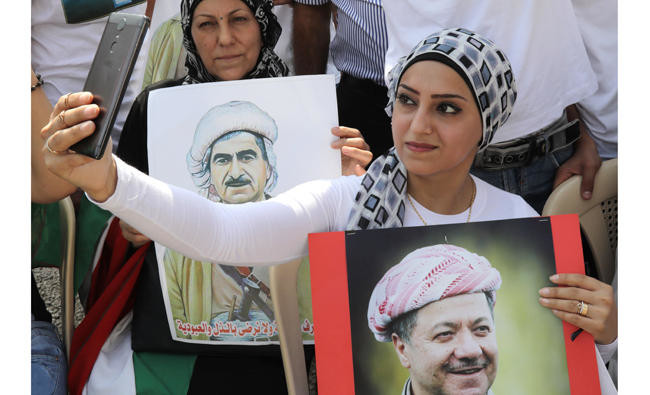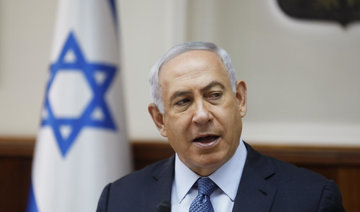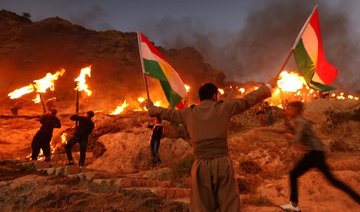JERUSALEM: Israel has become the only country to openly support an independent Kurdish state, a result of good ties between Kurds and Jews and expectations it would be a front against Iran and extremism, experts say.
Iraq’s Kurdish region plans to hold a non-binding referendum on statehood on Sept. 25 despite the objections of Baghdad and neighboring Iran and Turkey, as well as the US.
On Monday, Iraq’s Supreme Court ordered the suspension of the referendum as legal and political pressure mounted on the Kurds to call off the vote.
Israel became the first and so far only country to openly voice support for “the legitimate efforts of the Kurdish people to attain a state of its own,” as Prime Minister Benjamin Netanyahu said last week, without specifying where and how.
Netanyahu’s statement came after remarks made earlier in the month by former general Yair Golan, who said he liked the “idea of independent Kurdistan.”
“Basically, looking at Iran in the east, looking at the instability (in) the region, a solid, stable, cohesive Kurdish entity in the midst of this quagmire — it’s not a bad idea,” Golan said at the Washington Institute for Near East Policy.
He also noted Israel’s “good cooperation with the Kurd people since the early 1960s.”
To Gideon Saar, a former Israeli minister, the Kurds are a minority group in the Middle East that, unlike the Jews, have yet to achieve statehood.
“The Kurds have been and will continue to be reliable and long-term allies of Israel since they are, like us, a minority group in the region,” he said.
“We need to encourage independence of minorities that were wronged by regional arrangements since Sykes-Picot over the past 100 years and have been repressed under authoritarian regimes, like Saddam Hussein’s in Iraq and the Assads in Syria,” Saar said.
The Sykes-Picot agreement was a World War I-era deal between Britain and France laying out boundaries in the Middle East.
Saar too noted Kurdistan’s efforts in pushing back Islamist forces.
“Looking at the Kurds’ location on a map you realize they can be a dam blocking the spread of radical Islam in the region, and in practice we’ve seen them exclusively fighting IS,” he said.
“Throughout the years the Kurds were never drawn to anti-Israeli or anti-Zionist perceptions and maintained good ties with the Jewish people and Israel.”
Ofra Bengio, who heads a Kurdish studies program at Tel Aviv University, noted that Israel supplied covert military, intelligence and humanitarian aid to Kurdistan in the years 1965-1975.
When Jews living in Iraqi cities were subject to harassment under Baath rule in the early 1970s, Kurds smuggled them out of the country to safety, she said.
Former Kurdish leader Mustafa Barzani visited Israel, as did his son, current president of the Iraqi Kurdistan region Massud Barzani, and many Israeli officials have visited Kurdistan, Bengio said.
“I don’t know to what extent (Kurdistan) could be an ally since it would be pressed by all kinds of Arab factors, but at least it won’t be hostile toward Israel. That’s certain,” said Bengio, author of the book “The Kurds of Iraq: Building a State Within a State.”
“What’s more important, it would be a buffer against extremist elements — not just Iran, but also others,” she said, noting IS and Iraqi Shiite militias.
A Kurdistan which emphasises “secularity, democracy, moderation and acceptance of the other” would be “a positive element in a region that is becoming increasingly extremist and unstable,” Bengio said.
The US supports the current Kurdish autonomy in northern Iraq and relies on its forces in the war against Daesh, but has urged the Kurds to call off the potentially “provocative and destabilising” independence referendum.
To Saar, the former minister, Israeli leader Netanyahu should “use our leverage in the US to strengthen the Kurds in a very crucial moment of their national struggle.”
Israel sees benefits in independent Kurdistan: Experts
Israel sees benefits in independent Kurdistan: Experts

Sudan defense minister dismisses ‘intelligence document’ as fabrication after convoy strike

- Gen. Hassan Kabroun tells Arab News claims that army hid weapons in aid convoy are “completely false”
RIYADH: Sudan’s defense minister has firmly denied reports attributed to Sudanese intelligence alleging that a convoy targeted in North Kordofan was secretly transporting weapons under the cover of humanitarian aid.
Gen. Hassan Kabroun described the claims as “false” and an attempt to distract from what he called a militia crime.
The controversy erupted after news reports emerged that a document attributed to Sudan’s General Intelligence Service claimed the convoy struck in Al-Rahad on Friday was not a purely humanitarian mission, but was instead carrying “high-quality weapons and ammunition” destined for Sudanese Armed Forces units operating in the state.
The report further alleged that the convoy had been outwardly classified as humanitarian in order to secure safe passage through conflict zones, and that the Rapid Support Forces had destroyed it after gathering intelligence on its route and cargo.
Kabroun categorically rejected the narrative.
“First of all, we would like to stress the fact that this news is false,” he told Arab News. “Even the headline that talks about the security of the regions, such as Al-Dabbah, is not a headline the army would use.”
He described the document as fabricated and politically motivated, saying it was designed to “cover up the heinous crime they committed.”
The minister affirmed that the area targeted by drones is under full control of the Sudanese Armed Forces and does not require any covert military transport.
“Second, we confirm that the region that was targeted by drones is controlled by the army and very safe,” Kabroun said. “It does not require transporting any military equipment using aid convoys as decoys because it is a safe area controlled by the army, which has significant capabilities to transport humanitarian aid.”
According to the minister, the Sudanese military has both the logistical capacity and secure routes necessary to move equipment openly when needed.
“The army is professional and does not need to deliver anything to Kadugli or Dalang on board aid convoys,” he said. “The road between Dalang and Kadugli is open. The Sudanese forces used that road to enter and take control of the region. The road is open and whenever military trucks need to deliver anything, they can do so without resorting to any form of camouflage.”
Kabroun further rejected any suggestion that the military uses humanitarian operations as cover.
“Aid is transported by dedicated relief vehicles to the areas in need of this assistance,” he said. “Aid is not transported by the army. The army and security apparatus do not interfere with relief efforts at all, and do not even accompany the convoys.”
He stressed that the Sudanese Armed Forces maintains a clear institutional separation between military operations and humanitarian work, particularly amid the country’s crisis.
“These are false claims,” he said. “This fake news wanted to cover up the heinous crime they committed.”
Sudan has been gripped by conflict since April 2023, when fighting broke out between the Sudanese Armed Forces and the Rapid Support Forces, plunging the country into what the United Nations has described as one of the world’s worst humanitarian disasters.
The latest dispute over the convoy comes amid intensified fighting in South Kordofan, a strategically sensitive region linking central Sudan with the contested areas of Darfur and Blue Nile.
The false report suggested that intelligence monitoring had enabled the RSF to strike what it described as a military convoy disguised as humanitarian aid. But Kabroun dismissed that version outright.
“The intelligence agency is well aware of its duties,” he said. “The Sudanese Army has enough weapons and equipment to use in the areas of operations. These claims are completely false.”
He argued that the narrative being circulated seeks to shift blame for attacks on civilian infrastructure and humanitarian movements.
“This shows that they are trying to cover up the atrocities,” he added, referring to the militia.
Kabroun maintained that the army has regained momentum on multiple fronts and remains fully capable of sustaining its operations without resorting to deception.
“The region is secure, the roads are open, and the army does not need camouflage,” he said. “We are operating professionally and transparently.”
“These claims are completely false,” Kabroun said. “The Sudanese Army does not use humanitarian convoys for military purposes.”














